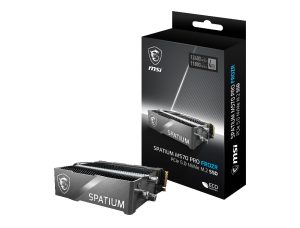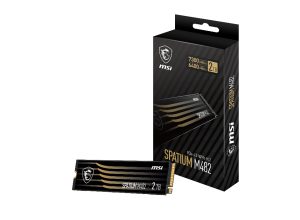MSI has recently announced the launch of its next-generation flagship SSD, the Spatium M570 Pro Frozr. This SSD was designed to provide lightning-fast read and write speeds, achievable thanks to the Phison E26 PCIe 5.0 controller and high-grade 3D NAND flash. Alongside the M570 Pro Frozr, MSI unveiled another mainstream PCIe 4.0 SSD, the Spatium M482.
The Spatium M570 Pro Frozr PCIe 5.0 NVMe M.2 SSD‘s core innovation is the Frozr passive SSD thermal technology, featuring machined heat pipes and an extensive surface heatsink. These components work together to transfer heat from the M570 Pro and distribute it down the whole length of the heatsink, enabling airflow through and lowering temperatures by up to 20°C. The U-shaped Core Pipes and flattened heat pipe surface provide excellent heat transmission to the top and centre of the surfaced heatsink, transforming the Frozr into a game-changing solution for maintaining throughput under high loads.


Available in 1TB, 2TB, and 4TB storage options, this SSD is powered by the latest Phison E26 PCIe 5.0 controller technology with cutting-edge 3D NAND flash. All of this together allows the SSD to provide transfer rates of up to 12,400MB/s sequential read and 11,800MB/s sequential write speeds.
The Spatium M482 PCIe 4.0 NVMe M.2 SSD was designed to fulfil the needs of mainstream SSD buyers. This SSD is compliant with PCIe Gen 4 and NVMe 1.4 standards and offers transfer rates of up to 7300MB/s sequential read and 6400MB/s sequential write. There are two storage capacities available: 1TB and 2TB.
Both SSDs offer various data error correction features such as LPDC ECC and E2E Data Protection. Additionally, these SSDs have a high TBW (Terabytes Written) for exceptional endurance and lifespan and come with a 5-year limited guarantee.
KitGuru says: PCIe 5.0 SSDs do generate quite a bit of heat at high loads so it will be interesting to see how well MSI's new Frozr passive cooler holds up.
The post MSI expands the Spatium SSD lineup with the M570 Pro Frozr PCIe 5.0 and M482 PCIe 4.0 SSDs first appeared on KitGuru.
0 comments :
Post a Comment